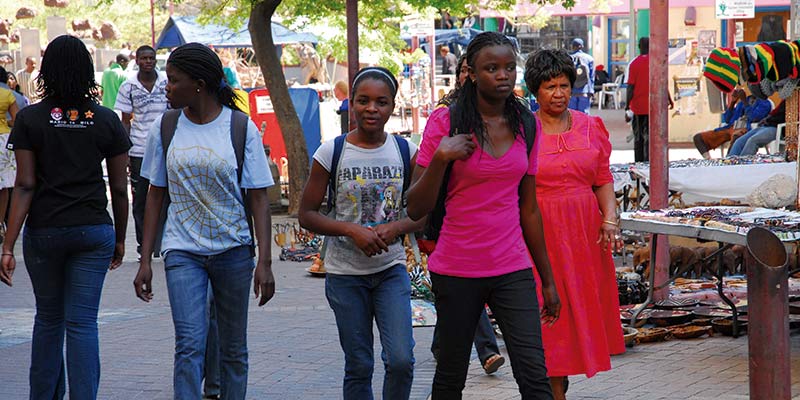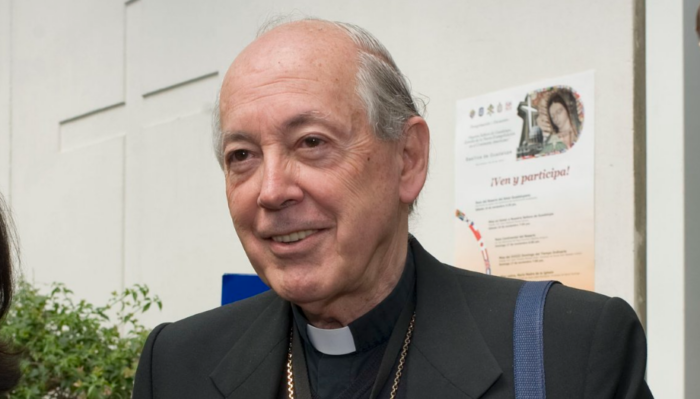Women in Africa have been making great strides towards social equality. After almost half a century of work, there are still a number of challenges ahead: the weight of traditions, the preference of men over women and the lack of financial independence are some of them.
TEXT - Fernando Serrano
Last summer, Liberian Ellen Johnson Sirleaf left the presidency of her country. She had been at the head of the executive for 11 years. In 2006, the year in which she came to power, a new era was inaugurated on the African continent. For the first time an African country was led by a woman.
Other countries such as Mozambique, Mauritius, Senegal, Sao Tome and Principe... have also had or have women at the head of the legislative or executive power. In recent years there has been a rise of women in positions of power and responsibility within the public and civil sphere.
"Once, years ago, when I was in the Congo, I heard from a veteran missionary that women sustain Africa. He told me that they rebuild, they fight to get ahead, they create mutual savings associations to support the small businesses they start, they raise their voices to ask for the wars to stop...."says Africa Gonzalez, a journalist specializing in the black continent.
Society in Africa
Africa is an immense continent that is developing gradually. In recent years, population growth has been just over 2 %. Of the continent's 1.216 billion inhabitants, 40 % are under 15 years of age and 60 % live in rural areas. Life expectancy is almost 60 years.
Other data that show the African reality are: 60 % of the population has access to drinking water, 30 % has access to electricity supply, there are 0.7 hospitals and 32 doctors per 100,000 inhabitants and only 5.2 % of the continent's expenditure is dedicated to social protection. As for educational spending, it amounts to almost 5 % of the Gross Domestic Product.
Preference of men over women
The executive director of the United Nations Entity for Gender Equality and Empowerment, Phumzile Mlambo-Ngcuka, recalled on the occasion of International Women's Day that "Too many women and girls devote excessive hours to household responsibilities; they typically spend more than twice as much time on these tasks as men and boys. They care for younger siblings, care for elderly relatives, care for sick family members, and perform household chores.
In many cases, this unequal division of labor takes place at the expense of women's and girls' learning, and their possibilities to obtain paid work, play sports, or serve as civic or community leaders. This determines patterns of relative disadvantage and advantage, the position of women and men in the economy, their skills, and workplaces.".
This is one of the main problems facing women in Africa: gender discrimination. "Africa is an immense continent. The Mediterranean area is not the same as South Africa, or West Africa as East Africa. There are countries like Kenya or Uganda that are states with a more European-style life. But there are also countries like Somalia, which is a failed state."Africa Gonzalez explains. Like the executive director, she also emphasizes the problem of discrimination against women: "I have been mainly in the eastern part of Africa and women face a very big challenge, that of discrimination. In the case of a family that has several children and not all of them can go to school, they will probably decide that the boys will be educated and the girls will stay at home helping and working in the house and doing the housework.". In sub-Saharan Africa only 41 % of university graduates are women.
In terms of economic activity, women are the ones who sustain the vast majority of small-scale agricultural activities and small commerce. In 80 % of cases, women are at the head of this type of informal economy. Other data highlighted by Mlambo-Ngcuka are that one third of women entrepreneurs have no training for their businesses and only 50 % of women entrepreneurs have access to financing and credit.
Ebele Okoye, a Nigerian pharmacist and promoter of Women Board's AMAD social project, highlighted this problem in a conversation with Palabra: "The problem is not only a problem for women, it is also a problem for men.Statistics show that there are twice as many women below the poverty line as men". Okoye, who received this year's Harambee Spain Award for the Promotion and Equality of African Women, also points out that "men in African culture tend to have a more privileged position. Everyone wants to have a son. A boy is much more easily accepted and cared for than a girl. In the case of Nigeria, the culture gives the boy a greater advantage.".
"In many African cultures the male is the person who inherits the property, he is the person who can buy land, make important family decisions without the need to consult...", Okoye continues to explain. "This patriarchal nature of Nigerian culture is the reason often given for the relative disempowerment of women, along with a mixture of cultural and religious beliefs that infringe on women's rights.".
The weight of traditions
Another problem faced by African women is the weight of certain patriarchal and family traditions. This includes those factors and cultural facts in which women do not have the capacity to make decisions, such as forced marriages, genital mutilation or customs in which families and husbands have the main voice.
African women have been fighting against this problem for more than 20 years. As early as 1978, the Senegalese writer and politician Awa Thiam wrote La Parole aux Négresses, in which she presented two phenomena that directly affect women: polygamy and female genital mutilation. In the document, she offered information gathered on the reality of women in some countries. A year later, the first seminar on Traditional Practices Affecting the Health of Women and Children was held in Khartoum, Sudan, with the support of the World Health Organization (WHO). Five years later, the Inter-African Committee on Harmful Practices Affecting the Health of Women and Girls was founded. This body is a platform to coordinate all programs carried out by national NGOs seeking to end the practice of female genital mutilation. Through the organization and promotion of training courses, seminars, discussion forums, etc., they seek to put an end to this tradition that affects several countries on the black continent.
Education as a tool
Data from the United Nations Educational, Scientific and Cultural Organization (UNESCO) reflect the importance of maintaining investment in education. Some of the indicators are as follows:
- Sub-Saharan African countries spend an average of 22 % of public expenditure on education;
- The primary education ratio is 70 %, although there are significant disparities between countries and regions;
- Significant progress has been made in equality between boys and girls in primary education;
- Literacy is one of the areas where the greatest progress has been made, among both youth and adults, with ratios of 78 % and 67 % respectively. Although the lowest data are found in rural areas, and particularly among women, it is noteworthy that female literacy is growing in sub-Saharan Africa, at a rate of 3.8% among adults, and even faster among young women;
- Male preference over women, poverty rates, lack of resources... are some of the barriers African women face in getting an education.
In the words of the AMAD social project promoter, Ebele Okoye: "We are very proud of this project.For me, I believe that some of the problems African women face can be improved and solved with education. Education is not a guarantee, but an educated woman is usually more likely to know and fight for her rights. She is also more capable of having a certain amount of independence to develop her life and career.".
Along the same lines, Africa Gonzalez describes the benefits of education and academic training: "There is a study by the World Health Organization that highlights that the more women complete secondary education, the less likely their families are to suffer from malnutrition, because they are more able to realize how to take care of them, feed them... They realize the importance of health and have easier access to these services.".
But it's not just academic education that needs to change. Okoye explains that "education is important for both women and men. In addition to formal education. I also think we should look at the way children are generally raised in Africa. Because of the education they received, some men get married and think they have someone to be their cook, launderer... Most of these tasks are considered only as women's work and sometimes it is almost a taboo to see men carrying out any of these duties to manage their own households". Okoye thus explains the need for social reorientation, especially in rural areas.
Rise of women in society
"The world is beginning to recognize the role of women in society, as evidenced by the increased focus that has been demonstrated globally towards creating equality between men and women.", notes Ebele Okoye. "It has been proven for centuries and in every country that women can hold power and wield it well. Compared to the number of men in positions of significant authority, the raw numbers may not reflect it, but the tide is turning.".
In 2006, Ellen Jonhson Sirleaf became president in Liberia, as we have said. Fatou Bensouda has been the chief prosecutor of the International Criminal Court since 2012. Ameenah Gurib-Fakim has been at the helm of the Mauritian presidency since June 2015. In 2004, Kenyan Wangari Maathai won the Nobel Peace Prize. Rwanda has the only parliament in the world in which women are in the majority, and in South Africa 40 % of the seats are held by women. These are just a few examples of the change that has been taking place in Africa in recent decades.
The woman pillar of Africa
"There is a saying in Nigeria: 'You empower a woman and you empower a society'. Women are powerful in building relationships and influencing the lives of many people."Okoye emphasizes.
Women in Africa are making great strides in their social normalization in the various public spheres. As the Nigerian pharmacist points out: "Women in Africa are making great strides in their social normalization in various public spheres.Although women now work outside the home, many of them have the inner strength to continue being the support of their family, friends... They are in charge of taking care of everyone in the concept of family that exists in Africa. A concept that is very broad and very strong. But they still have to work to meet the ever-increasing needs of modern life.".
"As you can see from the data, half of the population in Africa is made up of women. If there are so many women, they cannot be neglected for society to function well. The whole of African society is supported by the pillar formed by women. If a support were to be removed, it would be like standing on one foot only.", reflects the AMAD project promoter. "If this support were to be removed, what would be the result?".








